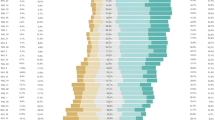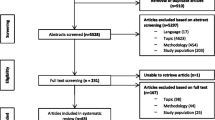Abstract
Background
Finding work is an important priority for many refugees in the initial years following settlement in a host country. Difficulties in finding work could conceivably both contribute to and be a consequence of symptoms of posttraumatic stress disorder (PTSD) and psychological distress commonly reported by refugees.
Purpose
We sought to determine the direction of these relationships and the possibility of a reciprocal association between employment status on one hand, and symptoms of PTSD and psychological distress on the other, in a large refugee sample.
Methods
A secondary analysis of three face-to-face interview assessments conducted across 5 years with 894 adult refugee participants (M = 39.9 years, SD = 12.8) from the Building a New Life in Australia study was conducted. Symptoms of psychological distress, posttraumatic stress, and employment status were assessed on each occasion. Preliminary analysis identified the cross-sectional relationships between psychological distress, PTSD symptoms, and employment status, while cross-lagged models were used to identify the longitudinal relationships between these respective symptoms.
Results
Symptoms of psychological distress and not being in paid work were significantly correlated with each other at each time point (ranging 0.09–0.25) and they reciprocally influenced each other over time. Likewise, PTSD symptoms and not being in paid work were correlated with each other after 3 years and 5 years (r = 0.21 and 0.23 respectively), and a reciprocal relationship between these was found over time.
Conclusion
The current findings indicate that interventions which target either mental health or work opportunities could have multiple downstream benefits for refugees.


Similar content being viewed by others
Availability of data and materials
The data from the BNLA study can be accessed through the National Centre for Longitudinal Data (NCLD) of the Australian Government Department of Social Services via the Dataverse platform. (https://dataverse.ada.edu.au/dataverse/bnla) with appropriate approval.
Code availability
Requests for analysis scripts and code can be sent to the corresponding author at david.berle@uts.edu.au.
References
UNHCR (2020) Figures At a Glance. https://www.unhcr.org/en-us/figures-at-a-glance.html: The UN Refugee Agency
Edwards B, Smart D, De Maio J, Silbert M, Jenkinson R (2017) Cohort Profile: building a New Life in Australia (BNLA): the longitudinal study of humanitarian migrants. Int J Epidemiol 47:20–20. https://doi.org/10.1093/ije/dyx218
Sharma S (2012) Psychological distress among Australians and immigrants: findings from the 2007 National Survey of Mental Health and Wellbeing. Adv Ment Health 10:106–116. https://doi.org/10.5172/jamh.2011.10.2.106
Bogic M, Ajdukovic D, Bremner S, Franciskovic T, Galeazzi GM, Kucukalic A et al (2012) Factors associated with mental disorders in long-settled war refugees: refugees from the former Yugoslavia in Germany, Italy and the UK. Br J Psychiatry 200:216–223. https://doi.org/10.1192/bjp.bp.110.084764
Schweitzer R, Melville F, Steel Z, Lacherez P (2006) Trauma, post-migration living difficulties, and social support as predictors of psychological adjustment in resettled Sudanese refugees. Aust N Z J Psychiatry 40:179–187. https://doi.org/10.1080/j.1440-1614.2006.01766.x
Nickerson A, Bryant RA, Rosebrock L, Litz BT (2014) The mechanisms of psychosocial injury following human rights violations, mass trauma, and torture. Clin Psychol: Sci Pract 21:172–191. https://doi.org/10.1111/cpsp.12064
Fazel M, Wheeler J, Danesh J (2005) Prevalence of serious mental disorder in 7000 refugees resettled in western countries: a systematic review. Lancet 365:1309–1314. https://doi.org/10.1016/S0140-6736(05)61027-6
Lindert J, von Ehrenstein OS, Priebe S, Mielck A, Brähler E (2009) Depression and anxiety in labor migrants and refugees–a systematic review and meta-analysis. Soc Sci Med 69:246–257. https://doi.org/10.1016/j.socscimed.2009.04.032
Steel Z, Chey T, Silove D, Marnane C, Bryant RA, Van Ommeren M (2009) Association of torture and other potentially traumatic events with mental health outcomes among populations exposed to mass conflict and displacement: a systematic review and meta-analysis. JAMA 302:537–549. https://doi.org/10.1001/jama.2009.1132
Arnetz J, Rofa Y, Arnetz B, Ventimiglia M, Jamil H (2013) Resilience as a protective factor against the development of psychopathology among refugees. J Nervous Ment Dis 201:167–172. https://doi.org/10.1097/NMD.0b013e3182848afe
Marshall GN, Schell TL, Elliott MN, Berthold SM, Chun CA (2005) Mental health of Cambodian refugees 2 decades after resettlement in the United States. JAMA 294:571–579. https://doi.org/10.1001/jama.294.5.571
Steel Z, Silove D, Phan T, Bauman A (2002) Long-term effect of psychological trauma on the mental health of Vietnamese refugees resettled in Australia: a population-based study. Lancet 360:1056–1062. https://doi.org/10.1016/S0140-6736(02)11142-1
Beiser M (1999) The Stresses of Resettlement. Strangers at the Gate: The ‘Boat People’s’ First Ten Years in Canada: University of Toronto Press
Chen W, Hall BJ, Ling L, Renzaho AM (2017) Pre-migration and post-migration factors associated with mental health in humanitarian migrants in Australia and the moderation effect of post-migration stressors: findings from the first wave data of the BNLA cohort study. Lancet Psychiatry 4:218–229. https://doi.org/10.1016/S2215-0366(17)30032-9
Nickerson A, Liddell BJ, Keegan D, Edwards B, Felmingham KL, Forbes D et al (2019) Longitudinal association between trust, psychological symptoms and community engagement in resettled refugees. Psychol Med 49:1661–1669. https://doi.org/10.1017/s0033291718002246
Porter M, Haslam N (2005) Predisplacement and postdisplacement factors associated with mental health of refugees and internally displaced persons: a meta-analysis. JAMA 294:602–612. https://doi.org/10.1001/jama.294.5.602
Brunnet AE, Bolaséll LT, Weber JLA, Kristensen CH (2018) Prevalence and factors associated with PTSD, anxiety and depression symptoms in Haitian migrants in southern Brazil. Int J Soc Psychiatry 64:17–25. https://doi.org/10.1177/0020764017737802
Thela L, Tomita A, Maharaj V, Mhlongo M, Burns JK (2017) Counting the cost of Afrophobia: post-migration adaptation and mental health challenges of African refugees in South Africa. Transcult Psychiatry 54:715–732. https://doi.org/10.1177/1363461517745472
Kartal D, Alkemade N, Kiropoulos L (2019) Trauma and mental health in resettles refugees: mediating effect of host language acquisition on posttraumatic stress disorder, depressive and anxiety symptoms. Transcult Psychiatry 56:3–23. https://doi.org/10.1177/1363461518789538
Murray KE, Davidson GR, Schweitzer RD (2010) Review of refugee mental health interventions following resettlement: best practices and recommendations. Am J Orthopsychiatry 80:576–585. https://doi.org/10.1111/j.1939-0025.2010.01062.x
Hocking DC, Kennedy GA, Sundram S (2015) Social factors ameliorate psychiatric disorders in community-based asylum seekers independent of visa status. Psychiatry Res 230:628–636. https://doi.org/10.1016/j.psychres.2015.10.018
Borsch AS, de Montgomery CJ, Gauffin K, Eide K, Heikkila E, Smith Jervelund S (2019) Health, education and employment outcomes in young refugees in the Nordic countries: a systematic review. Scand J Public Health 47:735–747. https://doi.org/10.1177/1403494818787099
Blight KJ, Ekblad S, Persson JO, Ekberg J (2006) Mental health, employment and gender. Cross-sectional evidence in a sample of refugees from Bosnia-Herzegovina living in two Swedish regions. Soc Sci Med 62:1697–1709. https://doi.org/10.1016/j.socscimed.2005.08.019
Bartley M (1994) Unemployment and ill health: understanding the relationship. J Epidemiol Comm Health 48:333–337
Price RH, Choi JN, Vinokur AD (2002) Links in the chain of adversity following job loss: how financial strain and loss of personal control lead to depression, impaired functioning, and poor health. J Occup Health Psychol 7:302–312. https://doi.org/10.1037/1076-8998.7.4.302
Modini M, Joyce S, Mykletun A, Christensen H, Bryant RA, Mitchell PB et al (2016) The mental health benefits of employment: results of a systematic meta-review. Australas Psychiatry 24:331–336. https://doi.org/10.1177/1039856215618523
Beiser M, Johnson PJ, Turner RJ (1993) Unemployment, underemployment and depressive affect among Southeast Asian refugees. Psychol Med 23:731–743. https://doi.org/10.1017/S0033291700025502
Beiser M, Hou F (2001) Language acquisition, unemployment and depressive disorder among Southeast Asian refugees: a 10-year study. Soc Sci Med 53:1321–1334. https://doi.org/10.1016/S0277-9536(00)00412-3
Wright AM, Dhalimi A, Lumley MA, Jamil H, Pole N, Arnetz JE et al (2016) Unemployment in Iraqi refugees: the interaction of pre and post-displacement trauma. Scand J Psychol 57:564–570. https://doi.org/10.1111/sjop.12320
Westermeyer J, Neider J, Vang TF (1984) Acculturation and mental health: a study of Hmong refugees at 1.5 and 3.5 years postmigration. Soc Sci Med 18:87–93. https://doi.org/10.1016/0277-9536(84)90348-4
Whooley MA, Kiefe CI, Chesney MA, Markovitz JH, Matthews K, Hulley SB et al (2002) Depressive symptoms, unemployment, and loss of income: the CARDIA study. Arch Int Med 162:2614–2620. https://doi.org/10.1001/archinte.162.22.2614
Olesen SC, Butterworth P, Leach LS, Kelaher M, Pirkis J (2013) Mental health affects future employment as job loss affects mental health: findings from a longitudinal population study. BMC Psychiatry 13:144. https://doi.org/10.1186/1471-244X-13-144
Hansen M, Andersen TE, Armour C, Elklit A, Palic S, Mackrill T (2010) PTSD-8: a short PTSD inventory. Clin Pract Epidemiol Ment Health 6:101–108. https://doi.org/10.2174/1745017901006010101
Mollica RF, Caspi-Yavin Y, Bollini P, Truong T, Tor S, Lavelle J (1992) The Harvard Trauma Questionnaire. Validating a cross-cultural instrument for measuring torture, trauma, and posttraumatic stress disorder in Indochinese refugees. J Nerv Ment Dis 180:111–116. https://doi.org/10.1097/00005053-199202000-00008
Furukawa TA, Kessler RC, Slade T, Andrews G (2003) The performance of the K6 and K10 screening scales for psychological distress in the Australian National Survey of Mental Health and Well-Being. Psychol Med 33:357–362. https://doi.org/10.1017/S0033291702006700
Hajebi A, Motevalian A, Amin-Esmaeili M, Rahimi-Movaghar A, Sharifi V, Hoseini L et al (2018) Adaptation and validation of short scales for assessment of psychological distress in Iran: the Persian K10 and K6. Int J Method Psychiatr Res 27:e1726. https://doi.org/10.1002/mpr.1726
Kessler RC, Green JG, Gruber MJ, Sampson NA, Bromet E, Cuitan M et al (2010) Screening for serious mental illness in the general population with the K6 screening scale: results from the WHO World Mental Health (WMH) survey initiative. Int J Method Psychiatr Res 19(Suppl 1):4–22. https://doi.org/10.1002/mpr.310
Muthén L, Muthén B (1998–2018) Mplus User’s Guide. Eighth Edition. Los Angeles: Muthén & Muthén
Preacher KJ, Coffman DL (2006) Computing power and minimum sample size for RMSEA [computer software]. Retrieved October, 2020, from http://quantpsy.org/
Roberts CE (2007). Mixing modes of data collection in surveys: a methodological review. ESRC National Centre for Research Methods
Lenferink LI, Nickerson A, de Keijser J, Smid GE, Boelen PA (2019) Reciprocal associations among symptom levels of disturbed Grief, posttraumatic stress, and depression following traumatic Loss: a four-wave cross-lagged study. Clin Psychol Sci 7:1330–1339. https://doi.org/10.1177/2167702619858288
Zyphur MJ, Allison PD, Tay L, Voelkle MC, Preacher KJ, Zhang Z et al (2020) From data to causes I: building a general cross-lagged panel model (GCLM). Org Res Method 23:651–687. https://doi.org/10.1177/1094428119847278
Akaike H (1998) Information theory and an extension of the maximum likelihood principle. In: Parzen E, Tanabe K, Kitagawa G (eds) Selected papers of Hirotugu Akaike. Springer, New York, pp 199–213
Little TD (2013) Longitudinal structural equation modeling. Guilford, New York
Côté-Lussier C, Mathieu M-È, Barnett TA (2015) Independent associations between child and parent perceived neighborhood safety, child screen time, physical activity and BMI: a structural equation modeling approach. Int J Obesity 39:1475–1481. https://doi.org/10.1038/ijo.2015.98
Kerkhof GF, Duivenvoorden HJ, Leunissen RW, Hokken-Koelega AC (2011) Pathways leading to atherosclerosis: a structural equation modeling approach in young adults. Hyperten 57:255–260. https://doi.org/10.1161/HYPERTENSIONAHA.110.163600
McArdle JJ (2009) Latent variable modeling of differences and changes with longitudinal data. Ann Rev Psychol 60:577–605. https://doi.org/10.1146/annurev.psych.60.110707.163612
LeMaster JW, Broadbridge CL, Lumley MA, Arnetz JE, Arfken C, Fetters MD et al (2018) Acculturation and post-migration psychological symptoms among Iraqi refugees: a path analysis. Am J Orthopsychiatry 88:38–47. https://doi.org/10.1037/ort0000240
Khoo SE (2010) Health and humanitarian migrants’ economic participation. J Immigr Minority Health 12:327–339. https://doi.org/10.1007/s10903-007-9098-y
Hamaker EL, Kuiper RM, Grasman RP (2015) A critique of the cross-lagged panel model. Psychol Method 20:102–116. https://doi.org/10.1037/a0038889
Ravn SL, Hartvigsen J, Hansen M, Sterling M, Andersen TE (2018) Do post-traumatic pain and post-traumatic stress symptomatology mutually maintain each other? A systematic review of cross-lagged studies. Pain 159:2159–2169. https://doi.org/10.1097/j.pain.0000000000001331
Cheng Z, Wang BZ, Taksa L (2019) Labour force participation and employment of humanitarian migrants: evidence from the building a new life in Australia longitudinal data. J Bu Ethics 168:697–720. https://doi.org/10.1007/s10551-019-04179-8
Renner W, Senft B (2013) Predictors of unemployment in refugees. Soc Behav Pers 41:263–270. https://doi.org/10.2224/sbp.2013.41.2.263
Martén L, Hainmueller J, Hangartner D (2019) Ethnic networks can foster the economic integration of refugees. Proc Nat Acad Sci 116:16280–16285. https://doi.org/10.1073/pnas.1820345116
Funding
None.
Author information
Authors and Affiliations
Corresponding author
Ethics declarations
Conflict of interest
None to declare.
Ethics approval
The current study gained approval from the Australian Data Archive to access and report on the data. Ethics approval was obtained from the University of Technology Sydney Human Research Ethics Committee (HREC no: 2018002456-14).
Consent to participate
All participants provided informed consent to participate.
Consent for publication
All the authors reviewed the final manuscript prior to submission and provided consent for the manuscript to be submitted for publication.
Supplementary Information
Below is the link to the electronic supplementary material.
Rights and permissions
About this article
Cite this article
Garton, A., Rogers, K. & Berle, D. Reciprocal relationships between employment status and psychological symptoms: findings from the Building a New Life in Australia study. Soc Psychiatry Psychiatr Epidemiol 57, 1085–1095 (2022). https://doi.org/10.1007/s00127-021-02204-8
Received:
Accepted:
Published:
Issue Date:
DOI: https://doi.org/10.1007/s00127-021-02204-8




